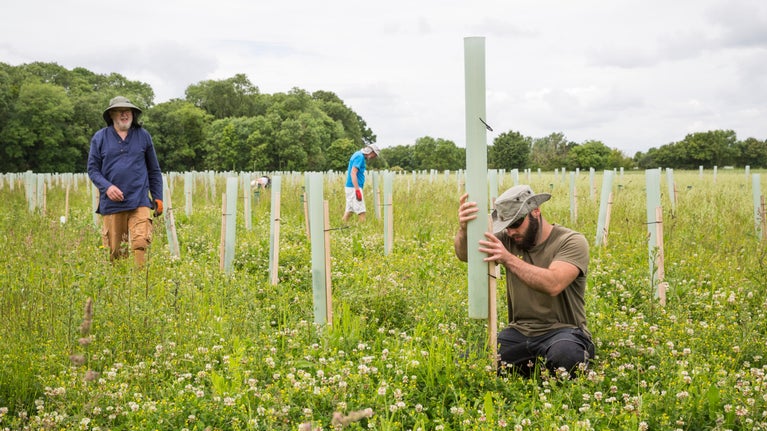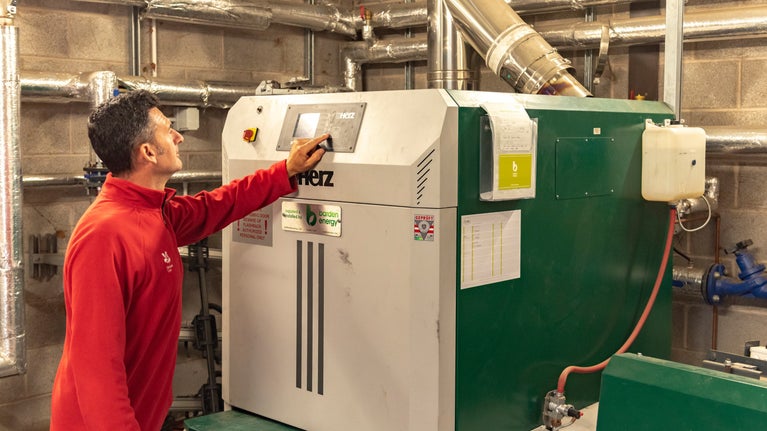
Tackling climate change
Uncover how we’re responding to the changing climate at places in our care.

Woodlands have been keeping us warm for millennia, and it's no different today. Over the years we've learned to use wood more efficiently, replenishing trees and protecting the beauty of the natural world. Biomass boilers and the careful approach of our rangers in managing woodlands help us do this. Biomass is transforming energy use at the places we care for in a positive way.
Biomass energy is a sustainable energy generated through burning wood, plants and other organic matter. Although carbon dioxide is released when it's burned, the lifecycle emissions are considerably less than fossil fuels.
Rangers carefully manage the woodland surrounding Croft Castle in Herefordshire and in the process create a sustainable supply of wood chip to feed the on-site biomass boiler. This, in turn, heats most of the buildings on the estate, including three domestic buildings, the farm and the mansion.
A programme of thinning removes the weaker trees from the woodland to allows seeds to grow. Wherever possible we allow the woodland to naturally regenerate but sometimes we give nature a helping hand using local seeds. By mixing up the species of trees this helps increase biodiversity.
Find out more about our work at Croft Castle
Barrington Court has cut its oil usage by 34,000 litres a year after replacing its two traditional boilers with a biomass boiler. The project, with took eight weeks to complete, will also result in an annual saving of almost £10,000. The wood pellets that now provide the heat come from UK sources and are provided by a local distributor.

The historic deer park at Dunham Massey is embracing a future fuelled by green energy. A biomass boiler has been installed to reduce the site's reliance on fossil fuels. Replacing electric and oil-powered heaters, the biomass boiler now heats the house, visitor centre, restaurant and all of the cottages on site, saving over £33,000 in heating costs every year and massively reducing the site's carbon footprint.
Discover how Dunham Massey is fighting climate change
Killerton has celebrated change throughout its history and it has also taken a bold and new approach to its energy use. Its three oil-fired boilers have been replaced with biomass boilers, which now heat the house and its water. This move has seen the estate reduce its oil consumption by 24,000 litres a year.
Our renewable energy projects reduce our dependence on fossil fuels and our impact on climate change. What's more, the money we save by being more energy efficient goes towards vital conservation work that protects the countryside and the wildlife that depends on it.
This ensures that the special places in our care will remain beautiful and full of life for future generations to enjoy.

Uncover how we’re responding to the changing climate at places in our care.
Discover which of the places in our care generate their own hydroelectricity, from a 19th-century 'smart home' in Northumberland to a state-of-the-art water turbine in scenic Snowdonia.

Discover how some of the special places in our care are harnessing the power of the sun to generate electricity and reduce their carbon footprints.

Using heat pumps to provide greener energy at the places in our care, from castle gardens to historic mansions, is helping to reduce our carbon footprint.

From tips on saving water to combatting plastic pollution, learn more about our work to protect precious coasts and rivers for wildlife and people, and what you can do to help.

Discover more about the National Trust’s role at COP26 in Glasgow and how you can help tackle the climate crisis.

With support from the Government’s Green Recovery Challenge Fund, we're looking for ways to protect our environment and combat climate change. Find out more about the work we're doing.
